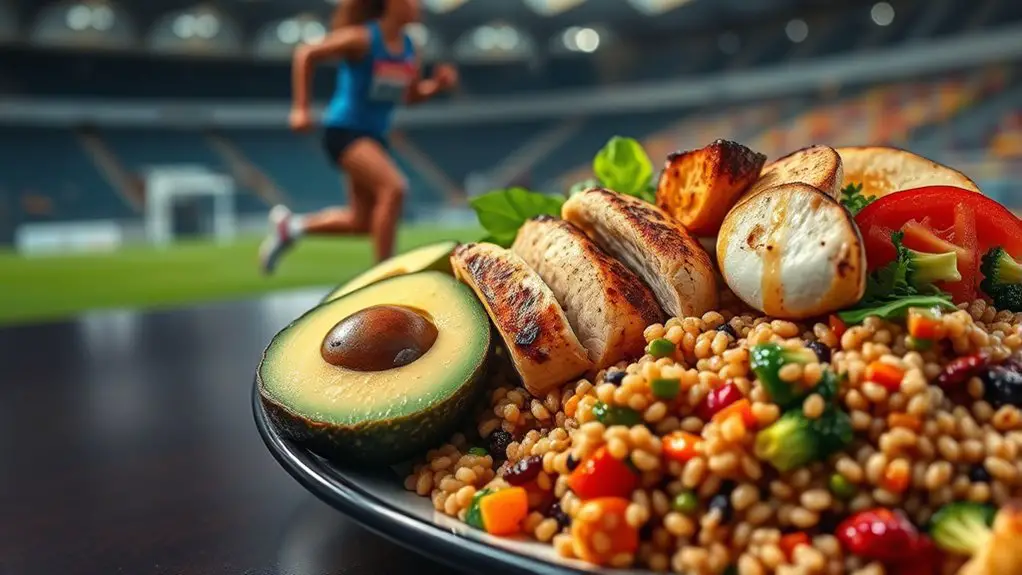As a weight-class athlete, you need to balance energy intake with your training demands. Focus on whole, nutrient-dense foods and prioritize carbs for energy and protein for muscle repair. Timing your meals is essential—eat a balanced meal 2-3 hours before workouts and refuel within an hour post-exercise. Don't forget hydration; it plays a key role in performance and recovery. There's more to uncover about maximizing your nutrition strategy effectively.
Understanding the Unique Nutritional Needs of Weight-Class Athletes
When you're competing in a weight-class sport, understanding your unique nutritional needs is essential for both performance and health. You need to balance your energy intake with your training demands while staying within your weight limit. This means being mindful of what you eat and when you eat it.
You'll want to focus on whole, nutrient-dense foods that fuel your body without weighing you down. Listening to your body's signals is imperative—experiment with meal timing to find what works best for you. Staying hydrated is just as important; water plays a key role in performance and recovery. Proper hydration enhances muscle function and performance, which is crucial for maintaining your competitive edge.
Don't forget that every athlete's needs are different, so tailoring your approach is crucial. Embrace the freedom to explore various foods and strategies, and find what makes you feel strong and energized. Balancing nutrition with your weight goals can empower you to reach your full potential in your sport.
Essential Macronutrients for Optimal Performance
To achieve ideal performance in weight-class sports, it's essential to understand the role of important macronutrients in your diet. Carbohydrates, proteins, and fats each serve unique purposes that fuel your body. Carbs are your primary energy source, especially during intense training sessions. They keep your glycogen stores full, helping you maintain stamina and power. Proper carbohydrate consumption is vital for optimizing your performance and ensuring you have enough energy to meet the demands of your sport. Proteins are critical for muscle repair and growth. They'll help you recover after workouts, ensuring you're ready for the next challenge. Aim for high-quality sources like lean meats, fish, and legumes. Don't overlook fats! Healthy fats provide long-lasting energy and support overall health. They're important for hormone production, which can impact your performance.
Timing Your Meals for Maximum Energy and Recovery
While proper nutrition is essential, the timing of your meals can greatly impact your energy levels and recovery as a weight-class athlete. To harness your full potential, you'll want to eat strategically around your training sessions. Consuming a balanced meal containing carbs and protein about 2-3 hours before your workout can fuel your performance and enhance your stamina.
Post-exercise, refueling within 30-60 minutes is vital. A protein-rich snack or shake helps repair muscles and kickstarts recovery, keeping you ready for your next challenge.
Don't forget about your daily meals; spreading them throughout the day maintains your energy and keeps you feeling balanced. Listening to your body's needs enhances overall well-being(Listening%20to%20the%20body's%20needs%20enhances%20overall%20well-being). By mastering meal timing, you can embrace the freedom to perform at your best, thrive in your training, and recover effectively, all while enjoying the journey of being a weight-class athlete.
Hydration Strategies for Weight Management and Athletic Performance
Although many athletes focus on their meals, hydration plays an equally critical role in weight management and performance. Staying properly hydrated can help you maintain energy levels, support metabolism, and enhance recovery. Aim to drink water consistently throughout the day, not just during workouts. Proper hydration regulates body temperature, which is vital for optimal athletic performance.
Here's a quick hydration guide:
| Activity | Recommended Intake |
|---|---|
| Before Exercise | 16-20 oz 2 hours prior |
| During Exercise | 7-10 oz every 10-20 mins |
| After Exercise | 16-24 oz for every pound lost |
Listening to your body is key. If you're feeling thirsty, that's a sign you need to hydrate. Remember, fluid loss can impact your performance, so don't let dehydration hold you back. Make hydration a priority, and you'll feel the difference in your training and competition!
Supplements: Do They Help or Hinder in Weight-Class Sports?
What role do supplements really play in the performance of weight-class athletes? While some swear by them, others argue they can hinder progress. The truth lies in how you use them. Supplements might offer an edge, but they aren't a magic fix. You need to focus on a balanced diet first.
- They can boost energy levels when you're fatigued.
- They might help recover faster after intense training sessions.
- They can enhance your focus, keeping you sharp during competitions.
- They could lead to dependency, overshadowing foundational nutrition.
- For example, creatine supplementation can enhance muscle energy during high-intensity activities, providing a tangible benefit for athletes.
Ultimately, it's about freedom—freedom to choose what serves your body best. Supplements can complement your efforts, but they shouldn't replace whole foods or well-planned meals. Stay mindful, trust your instincts, and verify your choices align with your goals. Embrace the journey, and remember, the best gains often come from the basics.
Frequently Asked Questions
How Can Stress Impact My Weight Management as an Athlete?
Did you know that 70% of athletes experience performance anxiety? Stress can lead to overeating or undereating, messing with your weight management. Finding balance and relaxation techniques can help you regain control and thrive.
What Role Does Sleep Play in Athletic Nutrition and Performance?
Sleep's essential for your athletic performance; it helps with recovery, energy levels, and overall focus. When you're well-rested, you're more likely to stick to your nutrition plan and achieve your goals effectively.
Are There Specific Diets to Avoid for Weight-Class Athletes?
Like a bird in a cage, certain diets can stifle your potential. Avoid extreme restrictions or fad diets that drain your energy and limit your performance. Focus on balanced nutrition to truly soar in your sport.
How Do Mental Strategies Affect Nutritional Choices in Athletes?
Mental strategies can considerably influence your nutritional choices. When you're focused and confident, you're more likely to make healthier decisions. Conversely, stress or anxiety might lead to cravings for less nutritious options. Stay mindful!
What Are the Long-Term Effects of Fluctuating Weight on Health?
Like a rollercoaster ride, fluctuating weight can wreak havoc on your health. You might experience hormonal imbalances, increased stress, and potential metabolic issues. Consistent weight management is key to maintaining your overall well-being and liveliness.




